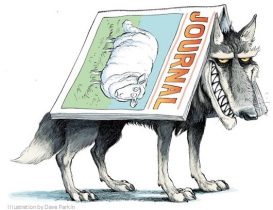
Think. Check. Submit.
This organization helps researchers identify trusted journals and publishers for their research. Through a range of tools and practical resources, this international, cross-sector initiative aims to educate researchers, promote integrity, and build trust in credible research and publications. “Think. Check. Submit.” checklist has been developed by a coalition of scholarly publishing organizations. These criteria are useful for authors considering where to submit their work, but as with the other initiatives are not a failsafe to identify all legitimate scholarly journals.
Definition of Predatory Publishing
Predatory publishers or journals are those which charge authors a fee for publication with no intention of providing the expected services – such as editorial or peer review – in return. Charging a fee is a legitimate business model, but the publisher should be providing a good publishing service in return. Authors, realizing that they have submitted their paper to a questionable publisher, can find they are charged a large fee if they want to withdraw their article.
Known synonyms for “predatory journals”
The concept of ‘predatory’ journals has many names: fake journals, questionable journals, illegitimate journals, deceptive journals, dark journals, and journals “operating in bad faith”.
Predatory or not?
There are many journals which do not have the best editorial or technical standards, but which are applying reasonable basic processes to their articles and operating in good faith. Some caution is therefore advised when considering a journal: defects in a publisher’s processes may lead to it being labelled as predatory but the journal may simply lack resources – there may not be an intention to deceive.
Things to watch out for
A predatory journal/publisher may display one or more of these characteristics:
- A journal title which can be easily confused with another journal or that might mislead potential authors and readers about the journal’s origin, scope or association with other journals
- Very wide scope
- Displays of unofficial impact factors
- False claims of being indexed in major services like PubMed or DOAJ
- No publisher address or contact information
- Unclear ownership of the journal
- Spams researchers with many emails inviting submissions, often unrelated to expertise
- Advertises very fast times from submission to publication
- Publishes out-of-scope articles
- Publishes nonsense articles
- Poor or non-existent editing of articles (many spelling mistakes or very poor grammar)
- Hides information on charges
- No editorial board is listed, or the editorial board comprises dead or retired scholars or scholars who are not specialized in the topic
- Lack of information on the policies of the journal, such as peer review, licensing and copyright
For further information please see: Think.Check.Submit.
